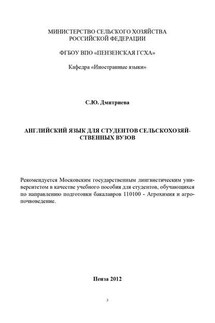Английский язык для студентов сельскохозяйственных вузов - страница 19
In front of the house there is a green lawn and a lot of flowers. Behind it there is an orchard with some fruit trees in it. Mrs Stanley is fond of flowers and trees. She often spends her spare time there. On the north side of the house there is a garage.
On the ground floor there is a kitchen, a pantry, a dining-room, a sitting-room and Philip’s study. On the first floor or upstairs you can find two bedrooms and a bathroom.
The furniture is modern and new. The windows are large. The family like to meet in the sitting-room in front of the fire-place. Philip has to pay a lot of money for the house before he can call it his own.
The Stanleys like their home. They enjoy its quiet pleasures, its comfort, its sweet familiar atmosphere.
Exercise 1. Read and translate the text.
Exercise 2. Look at the plan of the text. Is it correct?
I A Typical English House
II The Furniture
III Inside the House
IV Outside the House
V Sweet Home
Exercise 3. Answer the questions.
1) Is Philip Stanley’s house large?
2) What is there in front of the house and behind it?
3) What rooms are there on the ground floor?
4) What rooms are there on the first floor?
5) What kind of furniture have the Stanleys got?
6) What is Mrs Stanley’s favourite place?
– Let’s put … – Давай поставим …
– I’d like to … – Мне бы хотелось …
– It is not a very good idea. – Это не очень удачная мысль.
– Let it be so, dear. – О дорогая ( ой ), пусть будет так.
– You are right. – Ты прав( а ).
– Nothing of the kind. – Ничего подобного.
Task 1. Suggest Russian equivalents for the proverbs and sayings.
1) East or West – home is best.
2) My home is my castle.
3) Wash your dirty linen at home.
4) Everything is good in your garden.
Task 2. Make up a list of your household duties.
Begin with: “My regular duties are washing up dishes, …”
For help: to walk the dog, to cook breakfast, to repair things, to go shopping, to clean the house, to make my bed.
Ave. (Avenue), St. (Street), Rd. (Road), Bvld. (Boulevard), VLG. (village), PK (Park), SQ (Square)
Task 4. Look at this sitting-room. Do you like it? Does it look like yours? What is the difference? Can you describe it?
Use the phrases:
As for … ( что касается …)
In the middle of … ( в середине)
To the right ( left) of In front of …
We can see …
There is ( are)
Task 1. Look at the advertisements “Flat to let” and the people’s preferences. Tick the flat which best suits each person.
About 64 % of the British population live in houses or flats that they own or are buying in instalments (покупают в рассрочку). Most other people live in council accomodation, about 10 % rent from private landlords. People buying their property almost always pay for it with a special loan called a mortgage, which they must repay, with interest (с процентами), over a long period of time, usually 25 years.


